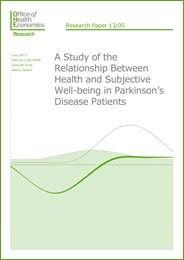Unlocking the Value of Combination Therapies



Significantly increases of wealth and health in the Western world over the past 50 years do not appear to have produced an equivalent increase in societal happiness, at least not using traditional measures. As a result, policy makers now are…

Significantly increases of wealth and health in the Western world over the past 50 years do not appear to have produced an equivalent increase in societal happiness, at least not using traditional measures. As a result, policy makers now are looking more closely at alternative ways of measuring the welfare of society, including measures of subjective well-being.
Significantly increases of wealth and health in the Western world over the past 50 years do not appear to have produced an equivalent increase in societal happiness, at least not using traditional measures. As a result, policy makers now are looking more closely at alternative ways of measuring the welfare of society, including measures of subjective well-being.
In the context of health, interest has grown in understanding both how current measures of health-related quality of life relate to subjective well-being and whether subjective well-being might provide a sound basis for health care resource allocation decisions in the future.
In this OHE Research Paper, the authors use Parkinson’s disease as a case study in assessing the fit between measures of health and subjective well-being. The findings suggest that some current measures, particularly the EQ-VAS and some dimensions of the EQ-5D, may be useful in predicting subjective well-being. The authors conclude, however, that further empirical research on measures and in other diseases is necessary.
Download Cubí-Mollá, P., de Vries, J. and Devlin, N., 2013. A study of the relationship between health and subjective well-being in Parkinson's disease. Research paper 13/05. London: Office of Health Economics.
An error has occurred, please try again later.
This website uses cookies so that we can provide you with the best user experience possible. Cookie information is stored in your browser and performs functions such as recognising you when you return to our website and helping our team to understand which sections of the website you find most interesting and useful.
Strictly Necessary Cookie should be enabled at all times so that we can save your preferences for cookie settings.
If you disable this cookie, we will not be able to save your preferences. This means that every time you visit this website you will need to enable or disable cookies again.
This website uses Google Analytics to collect anonymous information such as the number of visitors to the site, and the most popular pages.
Keeping this cookie enabled helps us to improve our website.
Please enable Strictly Necessary Cookies first so that we can save your preferences!